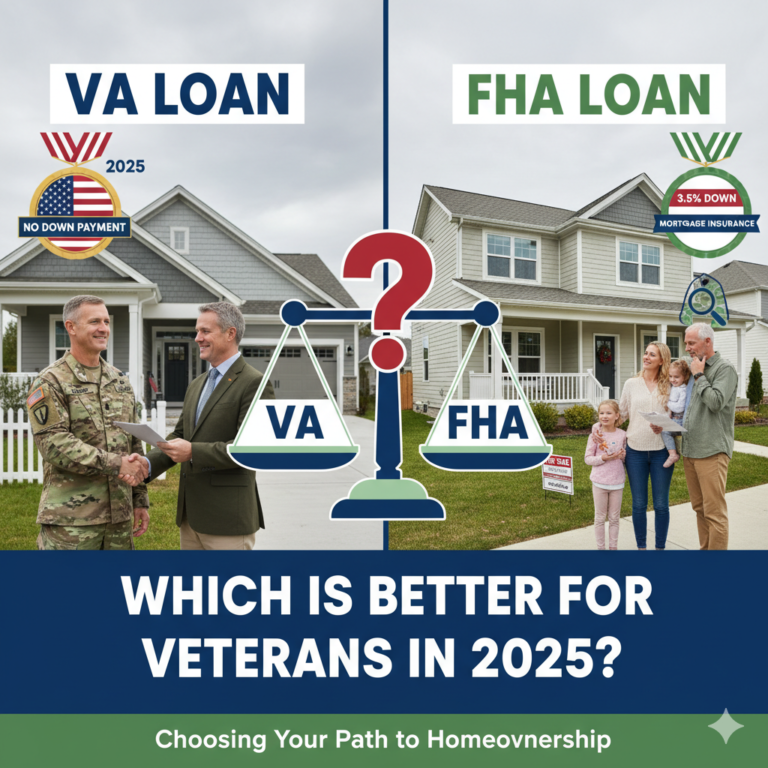When buying a home in 2025, veterans and active-duty service members often compare VA loans and FHA loans. Both are government-backed mortgage programs that make homeownership easier, but they serve different purposes and come with unique benefits. This guide breaks down the key differences so you can decide which loan best fits your financial goals.
🏠 1. What Is a VA Loan?
A VA (Veterans Affairs) loan is a mortgage backed by the U.S. Department of Veterans Affairs. It’s designed specifically for:
- Veterans
- Active-duty service members
- Certain members of the National Guard or Reserves
- Eligible surviving spouses
Key Benefits of VA Loans:
- ✅ No down payment required (in most cases)
- ✅ No private mortgage insurance (PMI)
- ✅ Competitive interest rates
- ✅ Easier qualification standards
- ✅ Flexible refinancing options through the VA IRRRL program
🏦 2. What Is an FHA Loan?
An FHA (Federal Housing Administration) loan is open to anyone who meets the income and credit requirements. It’s ideal for first-time buyers or people with lower credit scores.
Key Benefits of FHA Loans:
- ✅ Low down payment (as little as 3.5%)
- ✅ Lenient credit score requirements
- ✅ Available to all qualified borrowers, not just veterans
However, FHA loans require mortgage insurance premiums (MIP), which increase your monthly payment.
⚖️ 3. VA Loan vs. FHA Loan: Key Differences
| Feature | VA Loan | FHA Loan |
|---|---|---|
| Eligibility | Veterans, service members, and certain spouses | Open to all qualified buyers |
| Down Payment | 0% (in most cases) | 3.5% minimum |
| Credit Score Requirement | 580+ (varies by lender) | 580+ (3.5% down), 500–579 (10% down) |
| Mortgage Insurance | No PMI | Required (MIP) |
| Funding Fee | One-time VA funding fee (can be financed) | No funding fee |
| Loan Limits | No limits for eligible borrowers | Subject to FHA loan limits |
| Refinancing Options | VA IRRRL streamline refinance | FHA streamline refinance |
💡 4. Which Loan Is Better for Veterans in 2025?
If you’re a qualified veteran, a VA loan is usually the smarter choice because:
- You can buy with no down payment.
- You avoid mortgage insurance costs.
- You often get lower interest rates.
However, if you don’t meet VA eligibility requirements or have already used your VA loan benefit and prefer to keep it for another property, an FHA loan can still be a solid alternative.
🏁 5. Expert Tip: Combine Pre-Approval with Rate Comparison
Before applying, always:
- Get pre-approved by both VA and FHA lenders.
- Compare total costs, including closing fees, funding fees, and insurance.
- Choose the loan that offers the best long-term value based on your credit score, budget, and home price.
🔍 Final Thoughts
For most veterans in 2025, the VA loan wins — offering unbeatable benefits like zero down payment and no PMI. Still, every borrower’s situation is unique. If your credit history or property type doesn’t meet VA guidelines, an FHA loan remains a strong backup.

